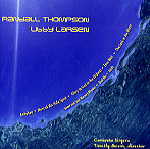What choral singer who’s performed English-language music during the past 50 years hasn’t sung Randall Thompson’s Alleluia, or The Peaceable Kingdom, or Frostiana? Of course, he’s one of America’s most revered composers whose works, especially for chorus, are continually programmed and recorded. But, Thompson’s Mass and other pieces presented here are not the reason to consider this a cappella program from the Stony Brook Camerata Singers. Although the opening Antiphon is skillfully written and is performed with exceptional precision and superb intonation–even under the scrutiny of a very close-up recording perspective–the following Mass of the Holy Spirit is one of the more long-winded, tediously overworked of all of Thompson’s compositions, with very weak, undevelopable thematic material that isn’t helped by the mostly homophonic, undulating chordal style and some occasionally awkward vocal parts. The chorus, so together and in-tune in the Antiphon also shows strain, especially in the Gloria, Sanctus, and Hosanna. And no one is helped by the overall recording balance that substantially favors the sopranos, muffles the inner voices, and in many sections reduces the basses to a muddy undercurrent.
Nevertheless, the works by Libby Larsen are well worth hearing–and the choir seems particularly attuned to these vibrant, compact pieces, full of wonderful melody and wit and humor and catchy rhythms. The three Nursery Rhymes feature a solo French horn, and Paul Lasurdo deserves special praise for his virtuoso performance–his instrument joining the fun as a playful, sometimes impish “character” (the totally unsubtle reference to Strauss’ Till Eulenspiegel in “There Was a Little Girl” and subsequent interjections are a delightful complement to the choir’s nonesense-syllable taunts). In “Try, Try Again” the horn persistently fails to properly render its scale/arpeggio passage, against the choir’s admonishment to “try, try again”. And, well, you’ll have to listen to see if he finally gets it right! The point is, this is the sort of music that’s fun to sing and exciting to hear, as are the other two–more serious–Larsen pieces. The disc’s problems mentioned above should serve as a caution–but, given the wonderful Larsen selections–not a complete deterrent to giving this a try. I’d love to hear this excellent chorus in other repertoire–and in a more favorable recording environment.
































